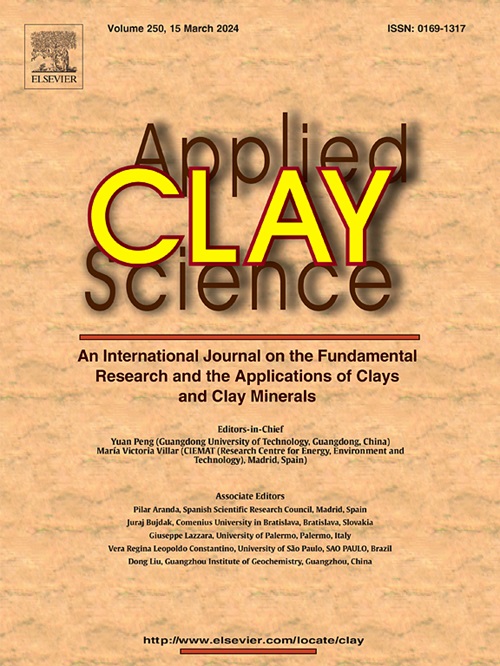Montmorillonite modification and chromate adsorption mechanisms of organo-montmorillonite: A multiscale study
IF 5.3
2区 地球科学
Q2 CHEMISTRY, PHYSICAL
引用次数: 0
Abstract
Cetyltrimethylammonium bromide modified montmorillonite (CTMAB-Mt) demonstrates effective removal of hexavalent chromium. It is crucial to understand the mechanisms by which changes in the microstructure of montmorillonite affect its adsorption capacity. This study combines molecular dynamic simulation, microscopic detection, and column/batch tests to reconstruct the microstructure of CTMAB-Mt at various loading levels and to investigate its chromate adsorption behavior. The results indicate that the primary modification mechanism of CTMAB-Mt involves ligand binding between the head group N(CH3)3 of the organic modifier and the surface oxygen of the siloxane layer in the clay. Compared to capture by CTMA+, CrO42− prefers to form aqueous complexes, resulting in limited enhancement of CTMAB-Mt's adsorption capacity at low loading levels (<1.00 CEC). Notably, Molecular dynamics simulations reveal that the adsorption capacity of 1.00 CTMAB-Mt is exceptionally high, reaching 7.87 mg/L. This finding is consistent with results from column and batch tests, providing a novel method for calculating the heavy metal adsorption capacity. The enhanced adsorption capacity is primarily due to electrostatic attraction and van der Waals forces between the head groups of CTMA+ and CrO42−. A comprehensive understanding of chromate adsorption by modified montmorillonite is essential for developing modified clay and preventing chromium pollution.

有机蒙脱石的蒙脱石改性和铬酸盐吸附机理:多尺度研究
十六烷基三甲基溴化铵修饰蒙脱石(CTMAB-Mt)可有效去除六价铬。了解蒙脱石微观结构的变化对其吸附能力的影响机制至关重要。本研究结合分子动力学模拟、显微检测和柱/批试验,重建了 CTMAB-Mt 在不同负载水平下的微观结构,并研究了其铬酸盐吸附行为。结果表明,CTMAB-Mt 的主要改性机制涉及有机改性剂的头部基团 N(CH3)3 与粘土中硅氧烷层的表面氧之间的配体结合。与 CTMA+ 的捕获相比,CrO42- 更倾向于形成水性复合物,这导致 CTMAB-Mt 在低负载水平(<1.00 CEC)下的吸附容量提升有限。值得注意的是,分子动力学模拟显示,1.00 CTMAB-Mt 的吸附容量非常高,达到 7.87 mg/L。这一发现与柱测试和批量测试的结果一致,为计算重金属吸附容量提供了一种新方法。吸附能力的增强主要是由于 CTMA+ 的头部基团与 CrO42- 之间的静电引力和范德华力。全面了解改性蒙脱石对铬酸盐的吸附对开发改性粘土和防止铬污染至关重要。
本文章由计算机程序翻译,如有差异,请以英文原文为准。
求助全文
约1分钟内获得全文
求助全文
来源期刊

Applied Clay Science
地学-矿物学
CiteScore
10.30
自引率
10.70%
发文量
289
审稿时长
39 days
期刊介绍:
Applied Clay Science aims to be an international journal attracting high quality scientific papers on clays and clay minerals, including research papers, reviews, and technical notes. The journal covers typical subjects of Fundamental and Applied Clay Science such as:
• Synthesis and purification
• Structural, crystallographic and mineralogical properties of clays and clay minerals
• Thermal properties of clays and clay minerals
• Physico-chemical properties including i) surface and interface properties; ii) thermodynamic properties; iii) mechanical properties
• Interaction with water, with polar and apolar molecules
• Colloidal properties and rheology
• Adsorption, Intercalation, Ionic exchange
• Genesis and deposits of clay minerals
• Geology and geochemistry of clays
• Modification of clays and clay minerals properties by thermal and physical treatments
• Modification by chemical treatments with organic and inorganic molecules(organoclays, pillared clays)
• Modification by biological microorganisms. etc...
 求助内容:
求助内容: 应助结果提醒方式:
应助结果提醒方式:


